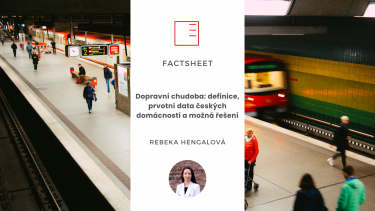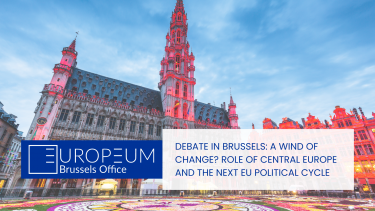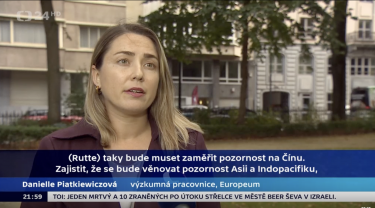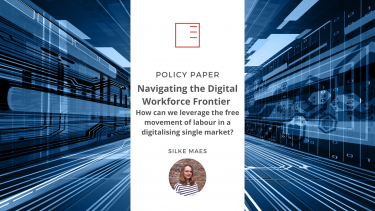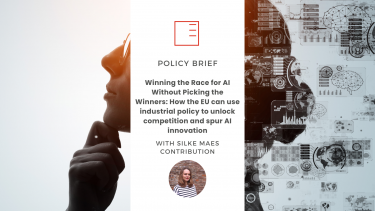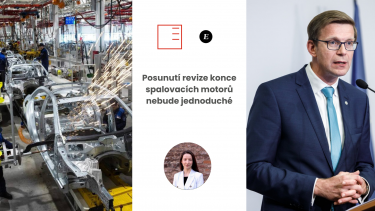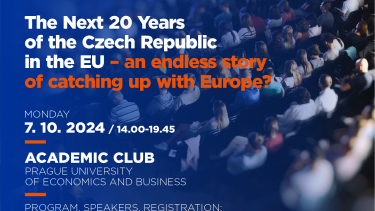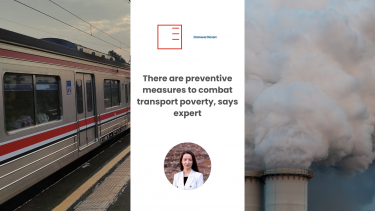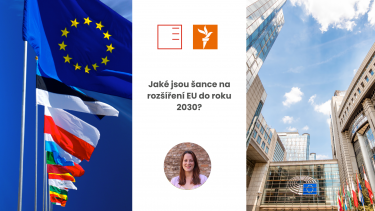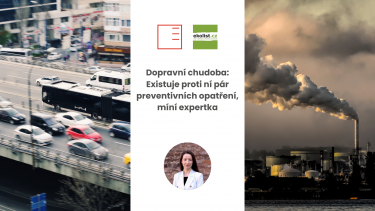Factsheet | Transport poverty: definition, primary data of Czech households and possible solutions
Already 3% of households in the Czech Republic are at risk of transport poverty, and this situation could worsen in a few years' time. Indeed, with the introduction of the ETS2, the emissions trading scheme for households, which extends emissions trading to road transport and local heating of buildings, fuel prices are expected to rise from 2027. This will have an impact on household budgets. Read the factsheet put together by Research Fellow at EUROPEUM Institute Rebeka Hengalová to find out exactly what transport poverty is and how it can be prevented and eradicated.
Show moreDebate in Brussels | A wind of change? Role of Central Europe and the next EU political cycle
As the dust settles after a hectic period of post-election negotiations, Von der Leyen’s second Commission is faced with serious economic challenges. Recent reports of Draghi and Letta have clearly indicated that the EU is lagging behind other global powers in the areas of growth and competitiveness and this is reflected in the composition of the College as well as within strategic priorities for the next political cycle. Come listen and debate about challenges EU is facing!
Show more
ČT24 | New Secretary General Rutte assures Ukraine of NATO support
The newly elected NATO Secretary General Mark Rutte went on his first working visit to Ukraine. He assured President Volodymyr Zelensky that he wants member countries to continue to support Ukraine and strengthen defense. Experts say they don't expect a change in the direction of the North Atlantic Alliance with the new chief, while warning that under the circumstances it will be the most difficult for him to keep the alliance together. For ČT24 comments Research Fellow at EUROPEUM Institute Danielle Piatkiewicz.
Show morePolicy Paper | Navigating the Digital Workforce Frontier
Since the pandemic, telework has been on the rise and is here to stay. In 2023, nearly 1 in 4 employees in the EU worked from home at least part of the time, and almost 75% want to continue teleworking at least several times a month. While teleworking within member states has become relatively easy, cross-border remote work remains fraught with administrative hurdles, costs, and uncertainties —especially for SMEs. In her latest Policy Paper, EUROPEUM Institute Research Fellow Silke Maes explores why remote work is still difficult, why regulating telework isn’t yet a priority, and how tax, social security, and labour law could be adjusted to the era of digital work.
Show morePolicy Brief | Winning the Race for AI Without Picking the Winners
Boosting European productivity and competitiveness hinges on both the development and uptake of technology, especially AI. Europe has a chance to place itself centrally in the AI value chain if the EU and its member states ensure access to computing power, data and finance as well as improving citizens’ basic and advanced digital skills. Research Fellow at EUROPEUM Institute Silke Maes, among other contributors, writes in this Policy Brief.
Show moreEkonomický deník | Postponing the revision of the end of internal combustion engines will not be easy
Czech Minister of Transport Martin Kupka announced at the end of September, following the example of Italy, that the revision of the end of internal combustion engines should take place earlier than in the originally planned 2026. Rebeka Hengalová, researcher at EUROPEUM Institute, commented for Ekonomický deník.
Show moreConference | The Next 20 years of the Czech Republic in the EU - an endless story of catching up with Europe?
How has the Czech Republic changed during its membership in the EU, how has it managed to catch up economically with its western neighbours? Where has it moved and where is the next potential? And does the Czech Republic have a strategy to build on? Come and listen to renowned speakers from across Europe and join the discussion on what we have achieved in the last 20 years in the EU and where we are moving as a country. We are co-organising the conference with the Prague University of Economics and Business.
Show more
Dopravní noviny | There are preventive measures to combat transport poverty, says expert
Emissions from road transport currently account for 29 per cent of all EU emissions, according to the latest Transport&Environment study. The problem is also that, unlike other sectors, emissions from transport have not been falling; on the contrary, they have been rising since 1990 and are at least beginning to stabilise. In the Czech Republic, transport emissions have increased by 62 per cent since 1990. Rebeka Hengalová, researcher at EUROPEUM Institute, commented for Dopravní noviny.
Show moreRadio Slobodna Evropa | What are the chances of EU enlargement by 2030?
The prospect of EU enlargement by the end of the mandate of the future European Commission looks more optimistic than at any time in the last decade. And barring the full membership of one new state, it is realistic to expect that at least one country will have concluded membership negotiations by the end of this decade and is just waiting for an acceptance date. Jana Juzová, a senior research fellow at EUROPEUM Institute, commented for Radio Slobodna Evropa.
Show moreEkolist.cz | Transport poverty: there are a few preventive measures against it, says expert
Transport costs may become more expensive under the new emissions trading scheme, which will hit low-income households hardest. But the so-called transport poverty need not only be financial. It is also about infrastructure accessibility and physical usability. Rebeka Hengalová, researcher at EUROPEUM Institute, commented for Ekolist.cz.
Show moreStaroměstské náměstí 4/1
Prague 1 - Staré Město
110 00
tel.: +420 212 246 552
email: europeum@europeum.org
https://www.europeum.org
